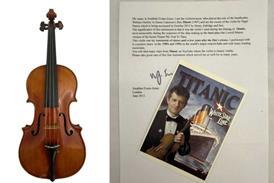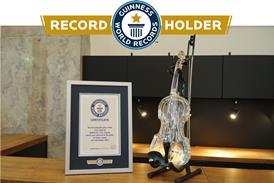- News
- For Subscribers
- Student Hub
- Playing Hub
- Podcast
- Lutherie
- Magazine
- Magazine archive
- Whether you're a player, maker, teacher or enthusiast, you'll find ideas and inspiration from leading artists, teachers and luthiers in our archive which features every issue published since January 2010 - available exclusively to subscribers. View the archive.
- Jobs
- Shop
- Directory
- Contact us
- Subscribe
- Competitions
- Reviews
- Debate
- Artists
- Accessories
Vincenzo Postiglione: Fair copies
Vincenzo Postiglione was one of Naples’ leading instrument makers in the late 19th century, and his work is well represented in its Conservatory of Music. Luigi Sisto examines two copies of instruments by Mariani and Gofriller, to find what they reveal about his making style
The Naples Conservatory of Music is the last in a long line of music schools based in the city. It continues the traditions of establishments such as the Santa Maria di Loreto, Sant’Onofrio a Capuana and Pietà dei Turchini, which contributed to the city’s musical life over the past five centuries. Since 1826 the Naples Conservatory has been located in the 14th-century architectural complex of San Pietro a Majella. An integral part of its heritage is the Musical History Museum, founded in 1868, where an abundance of fascinating rare instruments are preserved along with a collection of paintings and relics, a historical archive and a library. The museum houses the autograph manuscript of Giuseppe Verdi’s only string quartet, as well as a rare example of a diatonic harp, built in 1681 by Antonio Stradivari. Not only have these institutions been active in music tuition, but they have also contributed to the work of Naples’ instrument makers: they have kept luthiers busy in the repair and conservation of old instruments as well as commissioning new work.
One of the undisputed leading figures of Neapolitan instrument making in the 19th century was Vincenzo Postiglione. Born in 1831 he began an apprenticeship with Vincenzo Iorio aged 16, before establishing his own workshop in 1855. It was located at 24 Vico Tre Regine, in a small street in the heart of the commercial Spanish Quarter, just a few hundred metres from the Teatro di San Carlo, one of Europe’s oldest opera houses. It was also not too far from the Real Collegio di Musica, as the Naples Conservatory was then known…
Already subscribed? Please sign in
Subscribe to continue reading…
We’re delighted that you are enjoying our website. For a limited period, you can try an online subscription to The Strad completely free of charge.
* Issues and supplements are available as both print and digital editions. Online subscribers will only receive access to the digital versions.




























